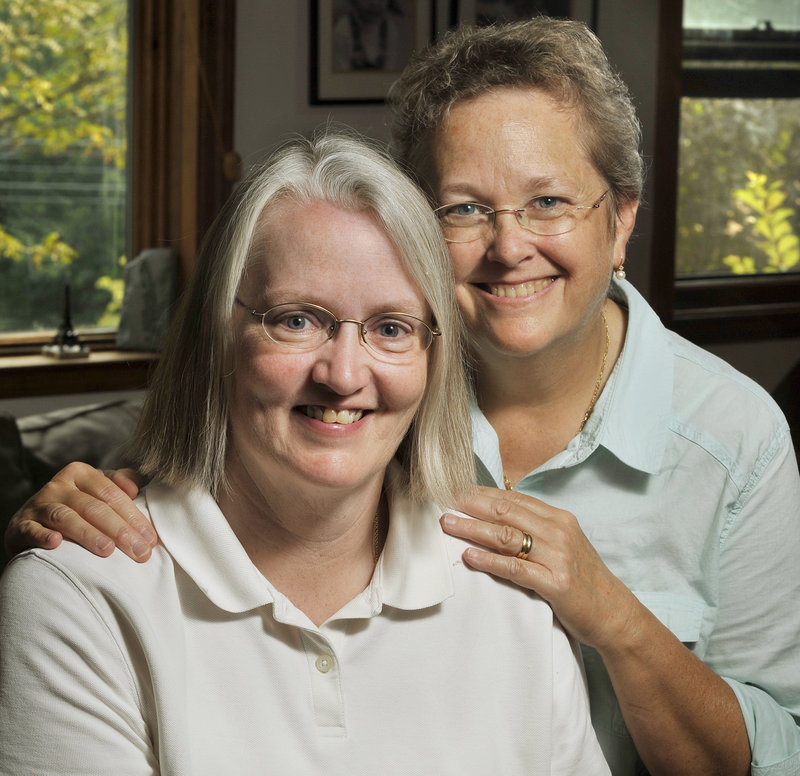FREEPORT – Sarah Dowling and Linda Wolfe had what they call a “non-legal wedding” in Maine 16 years ago, followed by a civil union in Vermont on their fifth anniversary.
Beyond those ceremonies, they have taken numerous legal and financial steps to try to protect themselves and their 11-year-old daughter, Meredith. That includes a durable power of attorney, a joint adoption, putting cars in both their names and buying domestic partner health insurance through an employer.
They haven’t put their home in Freeport in Dowling’s name because they would be subject to the real estate transfer tax, something married couples don’t have to pay.
“It would cost us money it wouldn’t cost a straight couple,” said Dowling, a 54-year-old social worker in Portland.
And when it comes to health insurance, they pay extra state and federal taxes — estimated at a couple of hundred dollars a year — that heterosexual couples don’t pay, either.
These are two reasons they and other gay and lesbian couples in Maine want the right to marry, among hundreds of state and more than 1,000 federal laws that confer rights and responsibilities on married couples.
And while the federal Defense of Marriage Act will still prevent benefits such as Social Security from reaching gay couples, even if they can marry in Maine, gay-marriage advocates say there are plenty of other reasons to let them marry.
“The biggest thing is we really feel like marriage is such a significant protection in and of itself,” said Matt McTighe, campaign manager for Mainers United for Marriage.
When the campaign on Question 1 heats up this fall, Mainers will be bombarded with arguments for and against changing the definition of marriage to include gay and lesbian couples. Supporters say the word “marriage” carries a special and universally understood meaning. Opponents say there’s no reason a 2004 domestic partnership registry set up by the state isn’t sufficient to protect committed couples, and if it isn’t, it can be expanded.
“That could be easily modified if there was some major weakness,” said Bob Emrich of Protect Marriage Maine. “We don’t want to alter marriage. If you want to add something else, that’s a separate question.”
There are hundreds of references in Maine law to marriage, spouses, husbands and wives, according to Gay & Lesbian Advocates & Defenders, a Boston-based legal rights organization. Married couples can transfer property and give each other financial gifts without paying taxes, they can file claims for wrongful death and injury of a spouse, they have an automatic right to inheritance, and they cannot be compelled to testify against each other in court, said Mary Bonauto, an attorney and civil rights project director for the group.
There are other tax implications, some which currently benefit same-sex couples — they don’t pay the marriage penalty because they aren’t legally married — and others that would reduce their tax liability if they could file jointly.
Emrich said the domestic partnership registry is sufficient to address most needs of committed couples. The couples can be same-sex or opposite sex, and by registering with the state, they qualify for seven benefits that include the right to inherit a deceased partner’s property, the right to be considered next of kin when making funeral or burial arrangements, and the right to take up to 10 weeks of unpaid leave to care for a seriously ill partner or child.
Since the law went into effect, 1,732 couples have signed up, with 231 terminating the arrangement, according to the Maine Department of Health and Human Services.
Dowling and Wolfe, a 57-year-old nurse practitioner, said they have not registered as domestic partners with the state, because by the time it became available in 2004, they had already taken the same steps on their own.
“People know what married people are,” Dowling said. “People don’t know what a civil union is and what a domestic partner is.”
Beyond state-level benefits, there are a whole host of federal benefits automatically granted to married heterosexual couples, such as Social Security spousal and survivor benefits. Even if voters approve gay marriage in Maine in November, gay married couples would not have access to Social Security benefits because of the federal Defense of Marriage Act. They would also not see a reduction in their health insurance costs unless the Supreme Court rules in their favor next spring, Bonauto said.
“Frankly, should (marriage be approved in Maine) and if we were to win DOMA by June, those federal benefits are available, there’s no doubt about it,” she said.
Greg Scott of the Alliance Defending Freedom, an Arizona-based group of Christian attorneys who fight for traditional marriage, said his group opposes civil unions or domestic partner registries because they inevitably lead to a fight for gay marriage.
“It’s not a middle ground, it’s a stepping stone to legal challenges to marriage,” he said. “We would not favor any system set up to mimic marriage in any way. It only leads to the (legal) challenges.”
Bonauto said the domestic partner registry in Maine is confusing and doesn’t cover all situations. For example, if a same-sex couple moves to Maine from another state, they must live together in Maine for at least 12 months before they can register. If a partner dies before the 12 months elapse, the survivor has no legal rights to make funeral arrangements. Those who are married can automatically take title of a vehicle previously owned by a deceased spouse without paying fees or taxes, but a partner does not have that ability.
For Bonauto and other same-sex marriage supporters, the fight for the right to marry goes to the heart of what it means to be committed to another person.
“When you’re married and it’s an emergency, nobody asks you for documentation,” she said.
Send questions/comments to the editors.



Comments are no longer available on this story